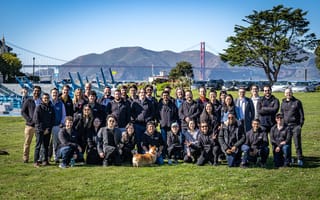
For some companies, working smarter and harder can mean the same thing. This is the case for San Francisco-based Butlr, which developed a solution that helps businesses track people’s presence and activity inside buildings. The company only tracks heat signatures, which Butlr co-founder and CPO Jiani Zeng said is more difficult than traditional monitoring with a camera.
“It’s actually easier to use a camera solution like high-resolution data to extract people’s activity information ... but we chose the hard way which is low-resolution thermal data because we are concerned with people’s privacy,” Zeng told Built In.
Founded in 2019, Butlr builds hardware and software that helps businesses gather spatial intelligence in real-time. Its smart technology leverages artificial intelligence and the internet of things to provide businesses with helpful data.
Butlr announced on Wednesday it raised a $5 million round of funding from Qualcomm Ventures, bringing its total funding to over $25 million. Butlr also announced the latest edition of its tech solution, a product called Heatic.
Heatic is a mountable, wireless sensor that tracks thermal data points and translates those points into a person’s indoor location or even body posture, according to Honghao Deng, Butlr co-founder and CEO.
Operating largely in the commercial real estate sector, Butlr has been gaining traction amidst the hybrid work boom.
The API-first solution is currently in use by more than 100 customers, many of which are Fortune 1000 companies, Deng said. These businesses count on Butlr’s tech to provide insights into how they can improve workspace planning, employee experience and facility management. For instance, Heatic can be used to track occupancy and capacity. After uploading their office floor plan to Butlr’s software platform, Heatic can provide companies with data as to where employees are moving throughout the space. Using these insights, companies can determine where it makes the most sense to consolidate their resources, Deng said.
As companies incorporate Butlr’s Heatic device and its open API offering, corporate users and IT teams can build out unique functionalities with Butlr’s sensing platform, Deng said. For example, Heatic can track when one person has been using a large conference room for a lengthy amount of time. Using Butlr’s tech, the company can build an internal tool to automatically cancel the booking for that room, freeing it up for more people to use, Deng said.
“The long-term vision is really to be a privacy-friendly nerve cell, but we also have a short-term mission [of] helping the hybrid workplace make the building more efficient,” Deng said. “We’re not just helping commercial real estate enterprise customers now thinking about hybrid work, we’re also helping them extremely fast.”
Deploying wired solutions can take anywhere from four months to a year, Deng said. Since Butlr’s sensors aren’t wired like LiDAR or camera solutions, Deng said Butlr’s customers can set up Heatic within minutes. Butlr can then send Heatic’s data findings to its customers within six weeks, Zeng said.
Butlr has now rolled out the updated version of Heatic which, according to Zeng, provides 80 percent more coverage than its predecessor. Going forward, the company plans to implement its tech in senior living facilities as a way to track residents’ movement and alert staff members to falls.
“We want to use this great technology to increase spatial understanding in a building environment while preserving individuals’ privacy and dignity,” Zeng said. “This goal never changed for us, even up to today.”
Equipped with its latest capital round, Butlr plans to expand its team across customer success. In addition to growing its San Francisco headcount, the company will make hires at its Boston location, where roughly 15 members of its current 60-person team are based, Deng said.



